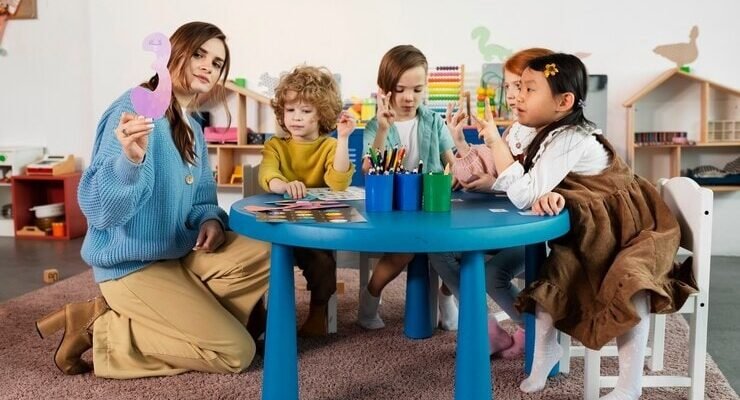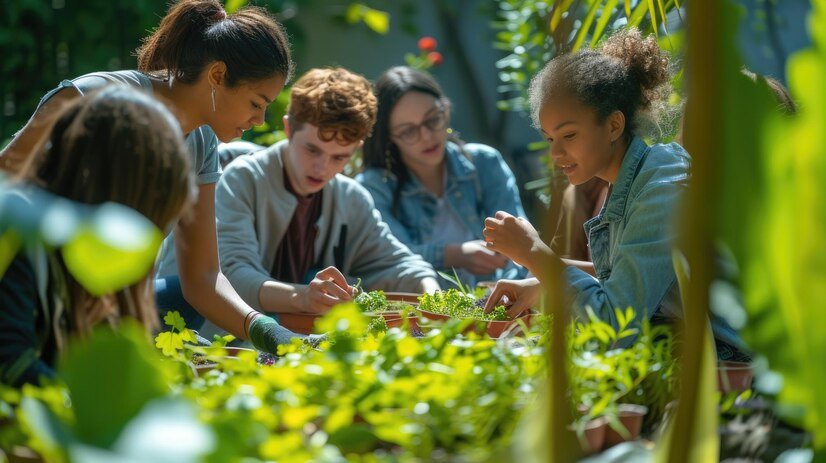
As parents, we all want the best for our children, but finding the right educational approach can be a daunting task. That’s where Montessori education comes in – a unique method that’s been gaining popularity for its emphasis on individualized, hands-on learning and fostering independence.
Key Takeaways
- Montessori education focuses on the whole child, allowing them to learn at their own pace and pursue their interests.
- Children engage in hands-on, sensory-rich activities that tap into their natural curiosity and love of learning.
- Mixed-age classrooms promote peer learning, with older students as role models and younger ones gaining confidence.
- The Montessori approach nurtures essential life skills like problem-solving, critical thinking, and intrinsic motivation.
- By cultivating a genuine love for learning, Montessori sets children up for lifelong success.
So, what exactly makes Montessori education so special? Let’s dive into the key advantages that have parents and educators buzzing with excitement.
A Tailored Approach for Every Child
One of the cornerstones of Montessori education is its focus on the individual child. Unlike traditional classrooms where a one-size-fits-all approach is often the norm, Montessori classrooms are designed to cater to each student’s unique needs, interests, and learning pace.
Imagine a learning environment where your child isn’t held back or rushed forward, but instead, can progress at their own rhythm. This personalized approach allows every child to reach their full potential, fostering a sense of accomplishment and confidence that sets the stage for future success.
Where Curiosity Meets Discovery
- Montessori classrooms are a sensory-rich playground, filled with specially designed materials that engage children’s natural curiosity and love of learning.
- Instead of sitting passively and listening to lectures, children in Montessori environments are encouraged to explore, touch, and manipulate objects, making learning a truly hands-on experience.
- This kinesthetic approach taps into the way young minds naturally learn, creating a deeper understanding and retention of concepts.
| Montessori Materials | Purpose |
|---|---|
| Sandpaper Letters | Introduce letter sounds and shapes through touch |
| Knobbed Cylinders | Develop size discrimination and motor skills |
| Sorting and Categorizing Activities | Foster logical thinking and classification skills |
By allowing children to learn through their senses and movements, Montessori education sparks a genuine joy for learning that lasts a lifetime.
Fostering Independence and Self-Direction
Have you ever noticed how children thrive when given the freedom to make their own choices? That’s the philosophy behind the Montessori approach. These classrooms are carefully designed to promote independence, self-discipline, and self-guided learning.
From choosing their own activities to managing their time and cleaning up after themselves, Montessori students develop essential life skills that extend far beyond the classroom walls. They learn problem-solving, critical thinking, and, most importantly, intrinsic motivation – the drive to learn for the sheer love of it, not just external rewards.
Multi-Age Classrooms and Peer Learning A Collaborative Community
In a traditional classroom, children are often segregated by age, but Montessori environments embrace a mixed-age approach. Here, younger and older students learn side-by-side, creating a dynamic, collaborative community.
Older children serve as role models and mentors, reinforcing their own knowledge by teaching younger peers. Meanwhile, the little ones gain confidence and aspire to the achievements of their older classmates. This setup fosters a beautiful cycle of learning, where children of different ages support and inspire one another.
Social-Emotional Development
Beyond academics, the Montessori approach places a strong emphasis on nurturing children’s social-emotional skills. Through a carefully designed curriculum and classroom environment, students learn essential traits like empathy, cooperation, and conflict resolution.
Imagine your child developing the ability to understand and respect others’ perspectives, navigate disagreements with grace, and form meaningful connections with their peers. These invaluable skills lay the foundation for healthy relationships, emotional intelligence, and success in school and life.
The Montessori Environment A Playground for Learning
Step into a Montessori classroom, and you’ll immediately notice the carefully prepared environment. Every aspect, from the child-sized furniture to the meticulously organized materials, is thoughtfully designed to promote independent learning and exploration.
In this space, the teacher takes on the role of a guide, observing and gently directing children towards activities that pique their interests and suit their developmental needs. The environment itself becomes a silent teacher, inviting children to engage with their surroundings and make their own discoveries.
A Lifelong Love of Learning The Ultimate Gift
Perhaps the greatest advantage of Montessori education is the genuine, intrinsic love of learning it cultivates. By allowing children to follow their natural curiosities and interests, Montessori instills a sense of joy and excitement around the learning process.
This passion for knowledge extends far beyond the classroom walls. Just look at the long list of successful Montessori alumni, from founders of tech giants like Amazon and Google to renowned artists, scientists, and entrepreneurs. These individuals embody the true spirit of lifelong learning, constantly seeking new challenges and embracing growth.
Addressing Potential Concerns Finding the Right Fit
While the Montessori approach offers numerous benefits, it’s important to acknowledge potential drawbacks or challenges. One common concern is the cost, as many Montessori schools are private and can be expensive. Additionally, some parents worry about the transition from a Montessori environment to a more traditional school setting.
However, these concerns can often be addressed through research, communication with schools, and finding the right fit for your family. Many public and charter Montessori options exist, making this educational approach more accessible. And with proper preparation and support, the transition to a new learning environment can be a smooth one for children.
Conclusion Unlocking Your Child’s Potential with Montessori
As you can see, Montessori education offers a truly unique and powerful approach to early childhood learning. From its focus on individualized instruction and hands-on experiences to its nurturing of independence, social-emotional skills, and a lifelong love of learning, the Montessori method provides a holistic and enriching foundation for your child’s growth.
So, if you’re looking to unlock your child’s full potential and set them on a path to success, consider exploring the world of Montessori education. Whether through a dedicated Montessori school or incorporating elements of this approach at home, you’ll be giving your little one the gift of a joyful, self-directed learning experience that will serve them for years to come.
Remember, every child is unique, and finding the right educational fit is crucial. So, do your research, visit schools, and trust your instincts as a parent. With the right guidance and support, your child can blossom into a confident, curious, and lifelong learner, ready to take on the world with enthusiasm and grace.












